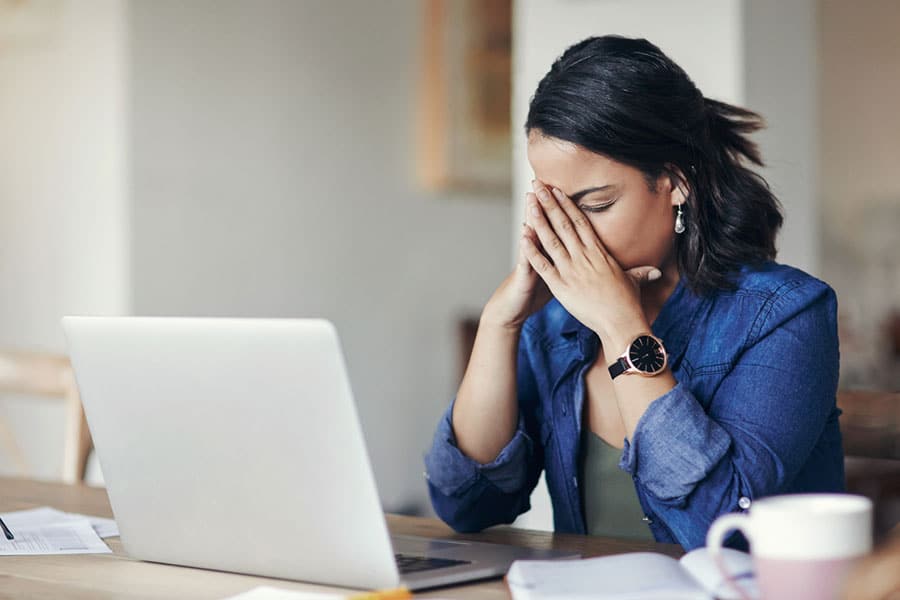If you struggle with anxiety, you may know that it oftentimes shows up at inconvenient times, like when you’re trying to get ready for a busy day or when getting ready for work. So, how can you navigate these symptoms without having to cancel your plans or taking a sick day from work?
First, let’s identify a few common anxiety-related symptoms:
Commons physical symptoms of anxiety:
- Increased heart rate
- Breathing rapidly (hyperventilation)
- Sweating
- Trembling
- Feeling tired, weak, or fatigued
- Troubles sleeping (inability to fall or stay asleep)
- Gastrointestinal (GI) issues / upset stomach
Commons emotional, cognitive, and behavioral symptoms of anxiety:
- Irritability
- Feeling nervous, tense, or restless
- Troubles concentrating or focusing
- Racing thoughts
- Overthinking or ruminating
- Avoiding situations that trigger anxiety or panic
- Difficulty making decisions
- Experiencing a sense of impending danger or panic
If you have experienced any of these symptoms, you know that they can seemingly come on quickly and can try to linger throughout the day. So, how can you manage these symptoms so you can enjoy your day, the way you planned?
Some helpful strategies to manage anxiety throughout the day include:
Relaxation Techniques
When we experience physical anxiety symptoms, our brain is convinced that we are in danger and it’s easy for our thoughts to be consumed by said anxiety-related thoughts. By practicing various relaxation techniques that work to calm down our nervous system, we can better manage the emotional, cognitive, and behavioral symptoms of anxiety. Some key relaxation techniques that can be used are:
- Breathing exercises (box breathing, deep breathing, alternate nostril breathing, paced breathing)
- Progressive muscle relaxation
- Meditation or other mindfulness activities
Self-Care
Self-care can take many forms, including physical, emotional, social, and intellectual. Symptoms of anxiety can be much more difficult to manage if these physical, emotional, social, and intellectual needs are not being met.
- Physical self-care: prioritizing sleep, eating balanced meals, engaging in regular exercise, and following doctor’s orders as applicable (i.e. taking medications as prescribed).
- Emotional and intellectual self-care: getting in touch with and understanding our emotional experience through the use of activities such as journaling, therapy, mindfulness, reading, learning a new skill, or creative expression.
- Social self-care: setting personal and professional boundaries, maintaining supportive and healthy relationships, engaging and connecting with others, limiting social media use and only engaging with helpful social media content.
Use Coping Skills
Filling your toolbox with various coping skills and strategies will be important in managing anxiety symptoms. Helpful coping skills include:
- Ride the Wave: accepting and riding out the intense emotions rather than trying to suppress or avoid them.
- Opposite Action: identifying the experienced emotion and action urge and choosing to act in opposition to your emotion and action urge.
- TIPP: Temperature change, Intense exercise, Paced breathing, Progressive muscle relaxation
- Grounding techniques: designed to reconnect you with your surroundings, diverting your focus from distressing emotions or memories.
- Check the Facts: helps evaluate if your thoughts, feelings, and emotional intensity are justified by the facts of the situation. This strategy encourages people to think before reacting to their emotions, and to reframe unhelpful thoughts or thinking patterns.
- Thought Defusion: a technique that helps create distance between an individual and their unhelpful thoughts and emotions.
Seek Support
You don’t have to go it alone. Seeking professional support in the form of therapy can be pivotal in navigating anxiety symptoms and building your toolbox. Seek help from a therapist who specializes in anxiety or panic.
By implementing these strategies, you can better navigate anxiety symptoms when they do appear, and feel more prepared to take on daily tasks.







